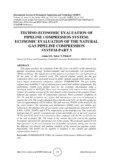JavaScript is disabled for your browser. Some features of this site may not work without it.
| dc.contributor.author | Aziaka, Duabari S. | |
| dc.contributor.author | Tukur, Nasiru | |
| dc.contributor.author | Pilidis, Pericles | |
| dc.date.accessioned | 2020-01-20T09:33:01Z | |
| dc.date.available | 2020-01-20T09:33:01Z | |
| dc.date.issued | 2019-11-23 | |
| dc.identifier.citation | Aziaka DS, Tukur N, Pilidis P. (2019) Techno-economic evaluation of pipeline compression system: economic evaluation of the natural gas pipeline compression system - part 3, International Journal of Mechanical Engineering and Technology (IJMET), Volume 10, Issue 11, pp. 133-154, Article number IJMET_10_11_012 | en_UK |
| dc.identifier.issn | 0976-6340 | |
| dc.identifier.uri | http://www.iaeme.com/ijmet/issues.asp?JType=IJMET&VType=10&IType=11 | |
| dc.identifier.uri | https://dspace.lib.cranfield.ac.uk/handle/1826/14953 | |
| dc.description.abstract | This paper presents the evaluation of the life cycle cost (LCC) of the natural gas pipeline investment using ‘’techno-economic and environmental risk assessment’’ (TERA) technique. The significance of this paper is to evaluate the cost implication of all the parts of this research work. The selected engines models for the gas compressor drive were developed based on public domain specification, using an inhouse engine performance simulation software: TURBOMATCH. The gas turbine engines were modelled to run at constant power amid high ambient temperature. The performance results were further used for the economic investigation using a developed model in MATLAB. These were investigated with respect to three seasons (winter, dry and hot season) of the years based on the location of this project (Trans- Saharan gas pipeline with 18 compression stations). Three economic conditions of 0%, 2% and 4% escalation rate of fuel and maintenance cost were investigated to analyse the LCC. The results obtained shows that the total LCC for the 0% escalation rate was approximately $32.01 billion. The fuel cost was 39.60% of the total LCC for the entire project. The operating and maintenance (O&M) costs, gas turbine, gas compressor, the pipeline with all accessories costs and emission tax attracted 10.1%, 6.89%, 9.95%, 28.89%, and 4.57%, respectively of the total life cost. The result also depicted that 2% and 4% escalation rate of fuel and O&M cost on the LCC result in 19.5% and 47.8% increased, respectively when compared with the 0% escalation rate at the end of project life. The result of the overall life-cycle cost of the pipeline investment represents the operational cost of the system. The proposed approach will help operators on the real potential cost of pipeline investment, taking into account the different cost element and ambient condition of the natural gas pipeline system. Importantly, this model can be applied or adapted to any natural gas pipeline transportation business. | en_UK |
| dc.language.iso | en | en_UK |
| dc.publisher | International Association of Engineering and Management Education | en_UK |
| dc.rights | Attribution-NonCommercial 4.0 International | * |
| dc.rights.uri | http://creativecommons.org/licenses/by-nc/4.0/ | * |
| dc.subject | TURBOMATCH | en_UK |
| dc.subject | TERA | en_UK |
| dc.subject | Investment | en_UK |
| dc.subject | Performance | en_UK |
| dc.subject | Inflation | en_UK |
| dc.subject | Capital cost | en_UK |
| dc.title | Techno-economic evaluation of pipeline compression system: economic evaluation of the natural gas pipeline compression system - part 3 | en_UK |
| dc.type | Article | en_UK |
Files in this item
The following license files are associated with this item:
This item appears in the following Collection(s)
-
Staff publications (SATM) [4367]

